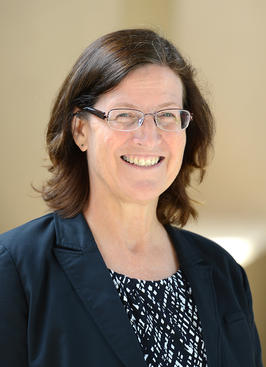
Years ago, Jean Helwege had just earned an undergraduate linguistics degree at the University of Chicago, and she was following Ronald Reagan’s first presidential campaign. “He said our economic situation could be improved if we deregulated and followed supply-side economics, and I was skeptical of that view,” says Helwege. “However, even though I had a well-rounded education, I knew I didn’t have the ability to figure out who had the right perspective on it. So, I wanted to learn more about economics.”
And she did. In the following years, Helwege earned both a master’s and a Ph.D. in economics at UCLA, and she was an economist at the Federal Reserve until 1998. She ultimately found her calling in academia—teaching at Ohio State University, University of Arizona and Pennsylvania State University—and joined UC Riverside’s School of Business in 2015 as a professor of finance, where she was recently named the Anderson Chair in Finance.
Helwege conveys obvious satisfaction in teaching at UCR specifically: “We are a school of moderate- to low-income students, and they don’t necessarily have career-related family connections or the world experiences that make it easy for them to jump into the finance arena,” she says, and she relishes their professional successes. “I’m very focused on their career preparation and workplace prospects.”
That commitment is also reflected in her role as faculty advisor to the Hylander Financial Group—a club for finance students who meet weekly to discuss stock market conditions and manage a real-fund $200,000 portfolio. She makes a clear connection between the importance of a hands-on experience, like the investment group, and a useful business education: “These students go out into the world and are successful because of this experience.”
Helwege has written, co-written and published more than 30 papers, and among the most well known are “Structural Models of Corporate Bond Pricing” (The Review of Financial Studies, 2004) and “Initial Public Offerings in Hot and Cold Markets” (The Journal of Finance, 1999). Helwege’s recent research includes a working paper, “Liquidity and Price Pressure in the Corporate Bond Market: Evidence from Megabonds,” and “How Does Low for Long Impact Credit Risk Premia?” issued in 2018.
“Three of these papers have something to say about corporate bond interest rates,” says Helwege. “In this environment today, corporate bond interest rates are extremely low, although always higher than the interest rates on a Treasury bond. Investors might not want to be in the stock market because it’s too scary, but Treasury bonds earn so little money.
“So, you will get some return for doing that, but the interesting question is why. Is it because the bonds might default? Is it because they are not very liquid? Or, is it because people ask for extra interest rate as they are worried about a tiny bit of default risk? These are the questions we explore.”
As she looks forward, Helwege continues to teach undergraduate and graduate students, alongside her focus on research, including as co-editor of the Quarterly Journal of Finance and associate editor of both the International Review of Finance and Journal of Financial Services Research.
With her considerable expertise, Helwege continues to share knowledge both through her research and courses, and says, “I want to see our students get the most they can out of a college degree.”
